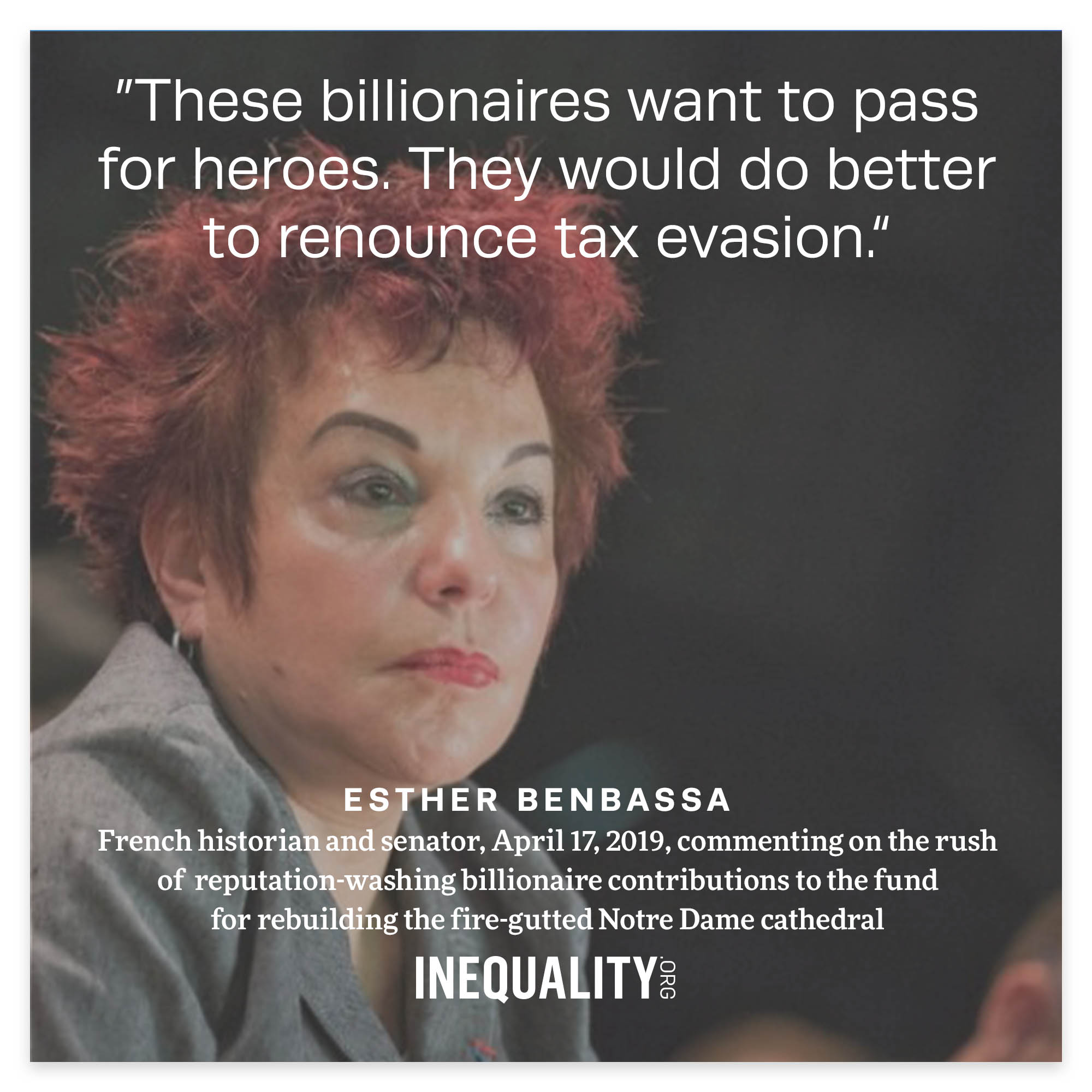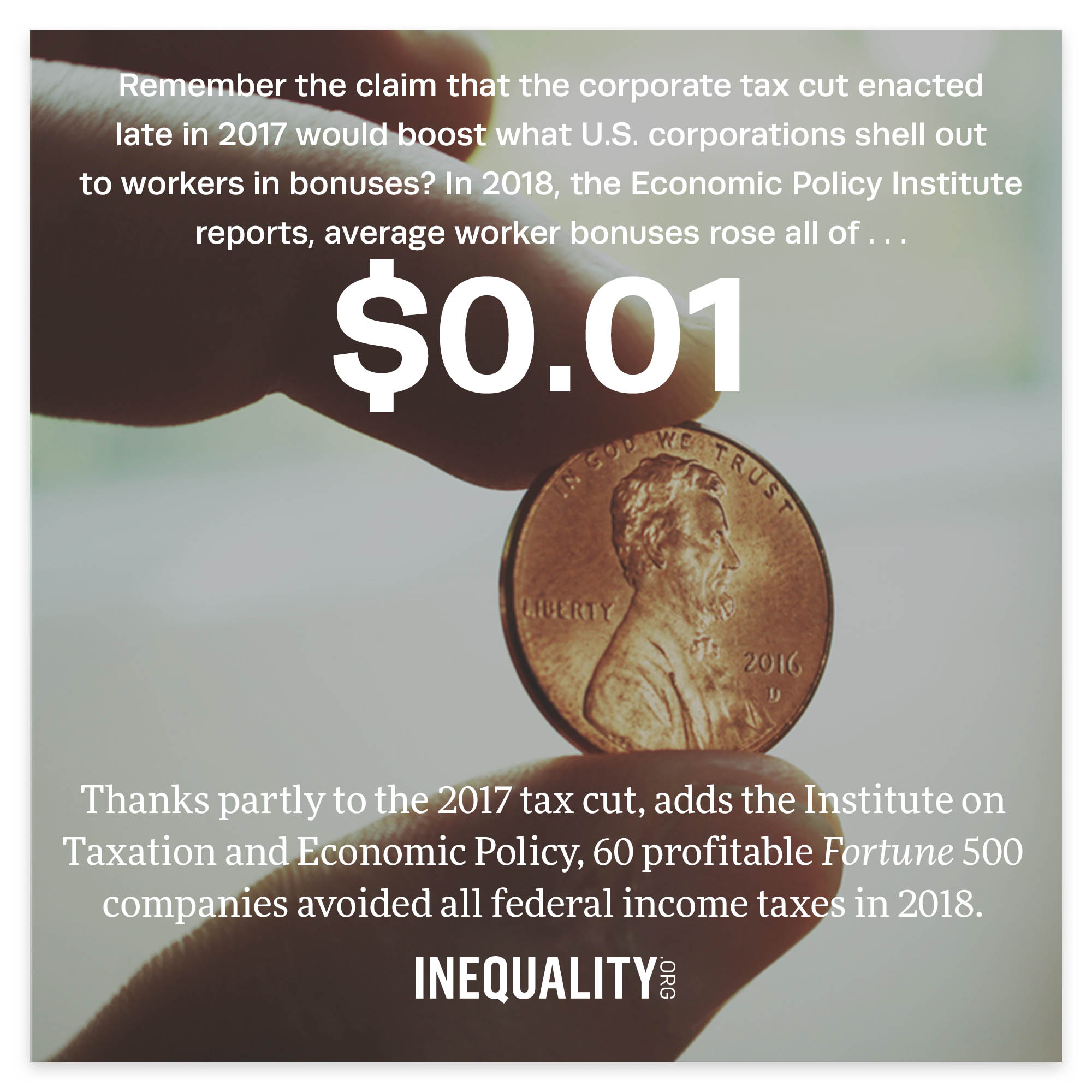Can you imagine the inequality that confronts us ever spurring a similar call for unified action? What if France’s billionaires cared as much about rebuilding their economy as rebuilding a great cathedral?
|
THIS WEEK
|
|
French president Emmanuel Macron seems to be hoping that the inferno at the famed Notre Dame cathedral will help him quell the “yellow vest” protests that have been a thorn in his side ever since December.
Macron is calling for a national display of unity, and some of his billionaire compatriots are heeding the call. They’ve pledged hundreds of millions toward restoring Notre Dame to its original splendor.
Can you imagine a similar response for unified action to combat inequality? What if billionaires cared as much about rebuilding economies as rebuilding a great cathedral? In June we'll be hosting a conference on various ways to address the outsized role the ultra-rich play in our economy and political system. We've got more information at the end of this week's issue for those who'd like to join us. Hope to see you there!
Chuck Collins, for the Institute for Policy Studies Inequality.org team |
|
|
|
|
INEQUALITY BY THE NUMBERS
|
 |
|
|
|
|
|
|
FACES ON THE FRONTLINES
|
 |
Playdate Protesters Stand By Stop & Shop Strikers
|
| More than 30,000 workers at Stop & Shop, a major supermarket chain in the northeastern United States, are going back to work after more than a week of strikes led to a tentative new contract with their employer. Over that time, the workers won backing from every corner of their community, from local rabbis preparing for Passover to placard-carrying toddlers. We have more this week on their strike and the community solidarity it inspired. |
|
|
|
|
WORDS OF WISDOM
|
 |
|
|
|
|
|
PETULANT PLUTOCRAT
OF THE WEEK
|
 |
| A Shrill Health Insurance Chief Goes in for the Kill |
| UnitedHealth CEO David Wichmann doesn’t much like all the talk going around these days about “Medicare for All.” In comments to stock analysts earlier this month, Wichmann intoned that proposals for Medicare for All would, if enacted, “destabilize the nation’s health system” and “surely have a severe impact on the economy and jobs.” He’ll likely prove right about the severity of that impact on his job. Medicare for All proposals introduced by Senator Bernie Sanders and Rep. Pramila Jayapal envision absolutely no role for private insurance execs who take home $83.2 million a year, Wichmann’s 2017 realized compensation. Share prices at UnitedHealth have nosedived since Sanders introduced his latest Medicare for All bill, as have shares at other big insurers. Their gravy train is clearly slowing. But what lush gravy that train has carried! Over the last decade, a business group has reported, average executive pay at leading U.S. health insurers has been growing at an annual 13 percent rate |
|
|
|
|
GREED AT A GLANCE
|
 |
|
|
|
|
|
|
TOO MUCH
|
 |
| Gentrification Has More than Landlubbers Worried |
| We typically think urban neighborhoods when we think gentrification. We think places where modest-income families have thrived for generations suddenly becoming no-go zones for all but the affluent. But the waters around us have always seemed a place of escape from this rampant displacement, a more democratic space where the rich can stake no claim. The wealthy, after all, can’t displace someone fishing on a lake. Or can they? People who work and play around our waters are starting to worry. Inequality.org co-editor Sam Pizzigati, author of The Case for a Maximum Wage, has more. |
|
|
|
|
|
|
MUST READS
|
This week on Inequality.org
Jessicah Pierre, A Revolutionary Idea to Close the Racial Wealth Divide. “Baby bond” accounts for all American kids would bridge the racial wealth gap while providing security to Americans of every color.
Todd Larsen, The Planetary Cost of Amazon’s Convenience. A Prime membership enriches a company that’s aggressively marketing itself to help major polluters.
Elsewhere on the web
Robert Reich, The 12 Biggest Myths about Raising Taxes on the Rich. The former U.S. labor secretary takes on the tales apologists for the awesomely affluent regularly trot out.
Bryce Covert, Why Democrats Like Taxes Again, New York Review of Books. Some Dems have realized we can wield taxes to reduce income inequality and shave power from America’s super rich.
Max Foley-Keene, The wealth gap degrades the rich and the poor, The Diamondback. A deep dive into what religion and research have to tell us about grand private fortune.
Janet Gornick, What Can Be Done About Inequality? Stone Center on Socio-Economic Inequality. The video of a New York forum last month that featured Inequality.org co-editors Chuck Collins and Sam Pizzigati.
Paul Krugman, Bernie Sanders and the Myth of the 1 Percent, New York Times. The very rich have become far richer than Americans imagine.
Aditya Chakrabortty, The billionaires’ donations will turn Notre Dame into a monument to hypocrisy, Guardian. Handouts from France’s super-rich lend credibility to gross inequality.
Michael Tomasky, Is America Becoming an Oligarchy? New York Times. Growing wealth concentration threatens our basic democratic principles.
Morris Pearl and Pramila Jayapal, Tax Day 2019 is the perfect day to make the case for increasing taxes on the rich, NBC News. We should raise taxes to fix the broken system that perpetuates inequality.
James Mumm, Philanthropy on the Cusp of Change: Three Perspectives, Social Policy. A look at new books that weave an intricate portrait of philanthropy and the MarketWorld that defines it.
Aaron Elstein, Stealth pay fattening CEOs’ wallets, Crain’s New York Business. So you think America’s CEOs can't make magic happen? Companies are actually paying top execs dividends on shares of stock they do not own!
|
|
|
|
|
A FINAL FIGURE
|
 |
|
|
|
|
|
| UPCOMING CONFERENCE |
 |
| Finding the Cure for Excessive Wealth Disorder |
The Institute for Policy Studies, Inequality.org and the Economic Policy Institute invite you to attend a day-long conference on Taxing the (Very) Rich. Join tax policy experts, activists, advocates, organizers, and elected officials who will be making the case for taxing the very rich—and debating how best to do that.
Any serious policy agenda geared towards combating inequality and raising living standards for the vast majority must look to ultra-high earners in the top 0.1 percent, who wield disproportionate economic and political power.
Free with Eventbrite Ticket. |
|
|
|
|